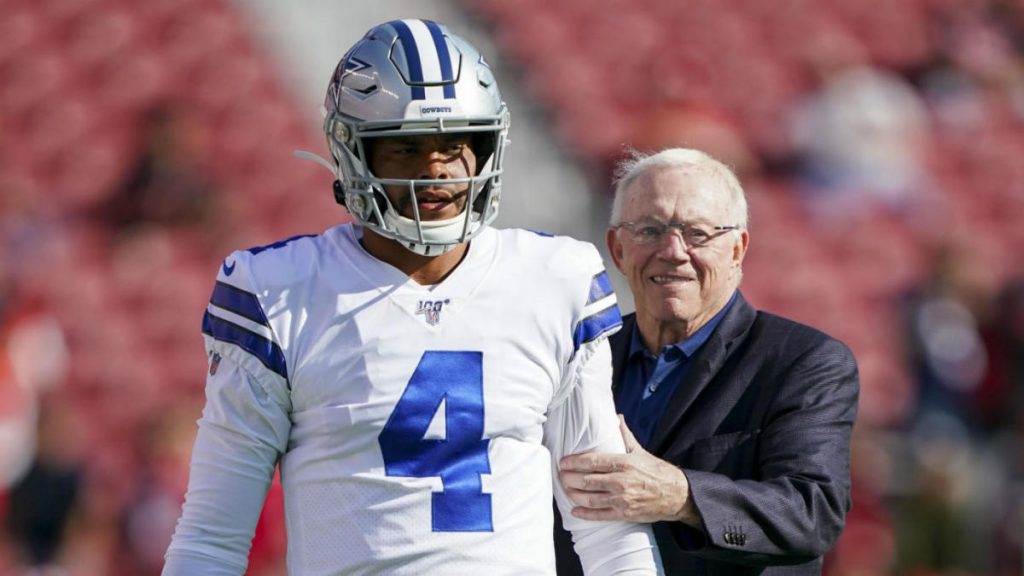Reports started on Friday night that the Dallas Cowboys intend to use the exclusive franchise tag on Quarterback Dak Prescott in the coming days. What would that major step mean for the negotiations between the team and the player, and what ripple effect could it have on the rest of Dallas’ 2020 offseason?
The Cowboys don’t have much longer to make this official. March 12th is the deadline for using the franchise or transition tags in 2020.
There is one way the #Cowboys can make sure Dak Prescott doesn't go anywhere & that’s to give him the exclusive franchise tag. Sources say that’s the tag — roughly $33M — they are likely to use. Dallas will try to work out a deal before the deadline, but that will be difficult. pic.twitter.com/kfCkPR1NE8
— Ian Rapoport (@RapSheet) February 29, 2020
https://twitter.com/JJT_Journalist/status/1234484220355076098
The distinction of the “exclusive” franchise tag is an important one. It would raise Dak’s 2020 salary (if he doesn’t wind up with a long-term deal) to about $33 million, while also denying him the ability to negotiate with other teams this offseason.
The non-exclusive franchise tag would be cheaper at about $27 million but would allow other teams to meddle in the talks between Prescott and the Cowboys.
Dallas appears to want to avoid that scenario, which is a good sign that they’re seeking to get a long-term deal done and are only using the franchise tag as an immediate protection. But that now means Prescott will view $33 million as the floor, or the bare minimum, for his annual salary in contract negotiations.
Using the franchise tag on Prescott also means the Cowboys will have one less option in their dealings with WR Amari Cooper and CB Byron Jones.
Thankfully, as we discussed earlier today, talks between the Cowboys and Cooper appear to be heating up. If a long-term deal can be struck with Amari before the March 12th deadline, Dallas might then be able to use the transition tag on Byron Jones.
The transition tag is basically a secondary, less powerful version of the non-exclusive franchise tag. It gives the original team the right to match any contract offer the player receives in free agency, but doesn’t provide any draft pick compensation if the player leaves.
If the Cowboys do intend to allow Byron Jones to test free agency, as has been reported, the transition tag would at least give them that last chance to block another team and match the contract if they so desire.

In addition to eating up the 2020 franchise tag, tagging Prescott would also create a greater burden on the salary cap this offseason. The full rough amount of $33 million would count against the cap, whereas the first year in a newly-extended contract could be significantly lower.
So not only would Dallas lose the option of tagging both Cooper and Jones, but they’d also lose cap dollars needed to re-sign or potentially replace them.
More cap space tied up in Dak could also mean tough decisions elsewhere on the roster. Dallas might have to make a choice between keeping DE Robert Quinn or WR Randall Cobb, or perhaps get more cap relief by cutting DL Tyrone Crawford rather than working out a reduced salary.
Even if the Cowboys do eventually work out a long-term deal with Prescott later in the offseason, the franchise tag could limit some of the things they’d like to do when 2020 free agency opens on March 18th.
So no matter how predictable or even inevitable this move seemed, it’s still a big moment for the Cowboys’ offseason. It sets the stage for everything else the team is trying to do in 2020 to get better and get back to the playoffs.
Again, it’s still not official. There are still 10 days until the deadline, and there’s a popular saying about how deadlines get deals done.
But as of now, until something changes, Dak Prescott appears set to become the first quarterback in Dallas Cowboys history to receive the franchise tag.